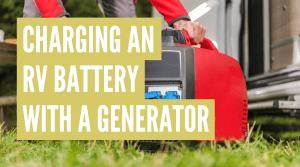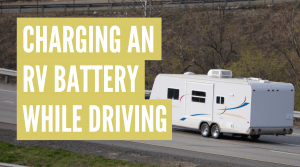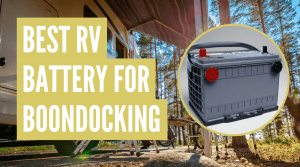Camper FAQs is reader-supported. Buying through links on our site may earn us an affiliate commission. As an Amazon Associate I earn from qualifying purchases.
RVs make it easy to bring the luxuries of home with you on the road.
However, to power some of those luxuries, you need to use battery power. But how do you charge your RV’s batteries? And does an RV battery charge when plugged into shore power?
Let’s take a closer look at how your RV battery system works and get answers to these popular questions.
When an RV Is Plugged in Does It Charge the Battery?
An RV battery will charge when it is plugged into shore power. In other words, your RV house battery will charge when plugged into an external power source that provides power to your RV.
This includes shore power, and when you’re plugged into a generator, your vehicle engine is running, or you have solar panels hooked up.
Did You Know…
When you connect your rig to shore power, the deep-cycle battery recharges via a power converter, which converts alternating current (AC power) into direct current (DC power) so that your battery can charge correctly.
Connecting to shore power is arguably the fastest way to charge RV batteries, especially when using a high-amperage multi-stage battery charger (second would be using an onboard or external generator).
With that said, it’s important to understand that plugging into an external power source will charge your house batteries but may or may not charge your chassis battery. What’s the difference?
- RV House Batteries: These are typically lead-acid, deep cycle batteries (though lithium batteries are another option) that power your 12v DC accessories like your water pump, cabin lights, fans, some TVs, control panels, etc. They can even power your 120v appliances and outlets if you have an inverter.
- RV Chassis Battery: Your chassis battery is similar to the car battery you would find in automobiles. It powers your headlights, dashboard, windshield wipers, and so on.
Whether your chassis battery charges when plugged into shore power or any other external power source depends on your particular RV model. If it doesn’t, you can start the engine and have the alternator charge it or use an external battery charger.
Did You Know…
RVs also have a 120V AC electrical system that operates the more power-intensive appliances. This system powers appliances such as your microwave, air conditioner, and 120V home electrical outlets. The power for this system comes from either shore power, a generator, or an inverter.
You can also link your house and chassis battery together so they both stay charged using a product like a Bird relay or Echo Charge.

Echo Charge for 12 & 24V Systems
Price:Clicking this link to make a purchase may earn us a commission at no additional cost to you.
How Do I Know if My RV Battery Is Charging?
Your RV battery will automatically start charging when you plug into an external power source, like shore power or a generator. You can test this by checking the battery’s voltage while it is being charged, which should read above 13 volts.
Once disconnected from the charger for 24 hours, a fully charged house battery at rest should read 12.6v.
How Long Do I Charge My RV Battery When Plugged In?
For the longevity of your battery, you should charge it often and allow it to fully charge when plugged in. Keeping your RV or travel trailer battery above 80% charged (12.4v) at all times is ideal.
And if you have a modern camper with a smart charger that utilizes a 3 or 4-stage charging process, you should be fine leaving your RV plugged in all the time and not worry about overcharging your battery.
More importantly, you don’t want your battery to drop below 20% of charge, as this can damage the battery, reduce battery life, and make it near impossible to restore a full 100% charge.
We typically recommend recharging your battery at no less than 50% of charge. A battery tester, multimeter, or voltmeter will tell you the charge level of your RV’s battery.

4-in-1 DC Electricity Usage Monitor, LCD Display Voltmeter
Price:Clicking this link to make a purchase may earn us a commission at no additional cost to you.
Should I Disconnect My RV Battery When Plugged In?
Disconnecting your RV battery when plugged into an external power source will disconnect your battery from the charging circuit, which means it will not charge. In other words, if you want your battery to charge when plugged in, keep your battery connected.
I like to keep things simple and only use the battery disconnect switch when my RV is in storage for a week or more.
Do I Need a Battery if My RV Is Plugged In?
You do not need a house battery if your RV or motorhome is plugged into an external power source, like shore power. However, you won’t be able to operate your 12-volt electrical appliances if there is a shore power outage.
Why Isn’t My RV Battery Charging When Plugged In?
If your RV battery is not charging while plugged in, there are several common reasons for this, including:
- Corroded or bad battery connections
- A dead or dying battery
- A failure in the converter (cooling fan, thermal sensor, circuit board component, etc.)
- A bad circuit breaker or fuse
- An issue with your shore power connection
Many of these issues can be tested with a simple voltmeter and fixed with a little know-how. Check out our step-by-step guide titled Camper Battery Not Charging When Plugged In? Do This! for more information.
Of course, if you don’t feel comfortable working with your battery charging system, take your vehicle to a certified RV technician.
Be sure to check out the other guides in our RV battery series, including:
- How to Charge an RV Battery While Driving: Learn how to charge your camper battery from a truck or any tow vehicle while driving. Plus, how to drastically increase the charging speed!
- How to Charge an RV Battery With a Generator: Step-by-step guide to charge your RV batteries with a generator. Plus, we cover important safety precautions you won’t want to miss!
- How to Hook up Solar Panels to RV Batteries: Learn how to easily hook up solar panels to charge your coach batteries and power your appliances.







Plugged in. 110 circuits working. Shouldnt this be ebough juice to keep converter working?
Batteries are dead.
Oh, its plugged to 30 amp. Tech says problem at post. But theres enugg juice to rum a lamp and a fan but not the converter? Diesnt make sense to me.
Hey Cindy, here are the steps I’d start with for troubleshooting this issue: https://camperfaqs.com/camper-battery-not-charging-when-plugged-in